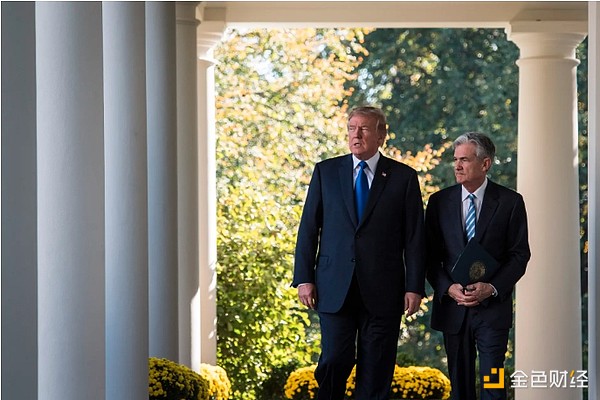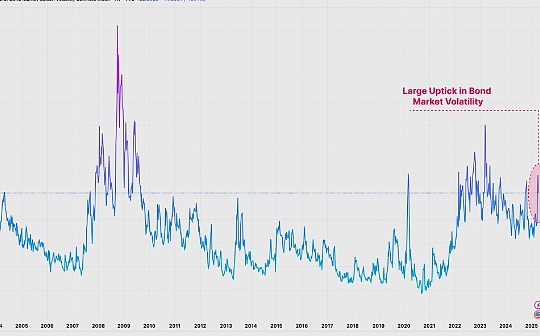Can Trump fire Powell? What economic risks will it bring?

Reprinted from jinse
04/18/2025·11DAuthor: Nik Popli, Time; Translated by: Tao Zhu, Golden Finance
The Fed has long prided itself on its independence from political pressure. But the tradition is under new pressure as President Donald Trump ramps up his attack on Fed Chairman Jerome Powell's refusal to cut interest rates.
" If I want him to step down, he will leave soon, believe me," Trump told reporters in the Oval Office on Thursday. The president further emphasized on his social media platform Truth Social: "Powell's sack came too slowly!" he wrote.

On Thursday, November 2, 2017, President Donald Trump, along with Fed Council member Jerome Powell, announced his nomination as the next Fed Chairman at the White House Rose Garden in Washington, D.C. Jabin Botsford – Washington Post via Getty Images
The attack is one of Trump's most sharp moves to date, aiming to undermine the political independence of an institution that has historically been unaffected by the White House and ensures stable economic management. Powell spoke at the Chicago Economic Club on Wednesday against political interference and said the Fed would make a decision based solely on the principles that are best for the American people.
“That’s the only thing we have to do,” Powell said. “We will never be affected by any political pressure…our independence is a legal issue.” Powell added that the Fed’s directors “can’t be removed unless there is a reason” and that “our term is long and seems unlimited.”
Still, that didn't stop Trump from trying to fire the Fed's chairman. "I don't think he did a good job" on Thursday, claiming that Powell's rate cut was "too late". Powell was first nominated as Fed chairman by Trump in 2017 and was nominated again by President Joe Biden in 2022. His current term as chairman will be extended until May 2026.
While previous presidents have expressed dissatisfaction with the Fed's interest rate decisions clash with its policy goals, Trump's remarks have once again raised concerns about political interference in monetary policy, a development that could disrupt markets and damage central bank credibility.
“The Fed needs public confidence,” said Sarah Binder, a Fed expert and senior fellow at the Brookings Institution. “But if the president tries to get Powell out of his position, that only increases uncertainty about the market’s unhappy.”
Here is a look at the president’s restrictions on the Federal Reserve’s power and the risks facing the economy.
Can Trump fire Powell?
From a legal perspective, the answer is complex and untested. The Fed chairman has never been removed from the president.
The Federal Reserve Act allows for the firing of board members, including the chairman, "for reasons." But historically, this has been interpreted as misconduct or incompetence rather than policy differences. “Courts don’t usually treat the divisions on interest rates as ‘just reason’,” Binder said.
Although Trump and his allies have been proposing the possibility of dismissing Powell since his first term, they have not done so, probably because of uncertainty in the legal environment and the political backlash that it will produce.
Powell himself also made it clear that he would not leave quietly. When asked last November whether he would quit if Trump asked him to quit, he briefly replied: “No.”
Nevertheless, the Trump administration appears to be laying the foundation for a potential confrontation. Treasury Secretary Scott Bessent recently told Bloomberg that he expected to start interviewing Powell's possible successor in the fall.
Trump's push to remove Powell comes as the Supreme Court is hearing a case involving the president's dismissal of the power of senior officials of independent agencies. Although the case involves the National Labor Relations Commission and the Merit System Protection Commission, its impact may be more extensive. If the court stands on the Trump administration, this could be interpreted as a signal of how it will resolve the legal conflict between Trump and Powell, although the Fed said it does not believe the challenge applies.
At the heart of this debate is a legal precedent nearly a hundred years ago: Humphrey 's Executor v. United States, a 1935 Supreme Court ruling that restricted the president's power to remove leaders of independent institutions without reason. The ruling has long protected the Fed's chairman from political dismissals, but may soon be tested by a conservative Supreme Court.
Economic risks
Trump accused Powell of failing to take positive enough action to support economic growth, saying the Fed chairman was "playing with politics" by maintaining interest rates. But central bank governors and many economists hold the opposite view: an independent Fed is essential to controlling inflation and guiding the economy, and succumbing to political demands can damage the economy and global trust in American institutions.
Powell insists that the Fed's decision is "only based on the principle that is most favorable to all Americans." In his speech on Wednesday, he warned that Trump's comprehensive tariff measures could put the U.S. economy in a "challenging situation", rising inflation and slowing economic growth - which would complicate the Fed's dual mission of price stability and full employment. Trump's tariffs have increased the cost of many imported goods, squeezed household budgets and raised concerns about policy slowing down the economy while inflation remains above the Fed's 2% target.
Meanwhile, the president demanded an immediate rate cut, noting that the ECB had cut interest rates on Thursday.
Yale University's Budget Laboratory estimates that the inflationary effect of Trump's tariffs is equivalent to $4,900 in actual taxes per household. Meanwhile, long-term interest rates have soared, leading to higher borrowing costs for home buyers, businesses and consumers.
Who is Jerome Powell
Powell, 71, is currently serving as the second term as chairman of the Federal Reserve, the most powerful economic policy-making body in the United States. As a Republican, he was a former investment banker and was appointed to the Fed by President Barack Obama in 2012 and promoted to chairman by Trump in 2017. Biden later appointed him again, demonstrating broad trust in his administration of the central bank.
During Powell's tenure, the Federal Reserve faced a series of economic shocks, from the recession caused by the epidemic to the worst inflation soaring in four decades. Under his leadership, the central bank lowered interest rates to near zero in 2020 to stabilize the economy during the COVID-19 pandemic, and then raised interest rates from 2022 to curb inflation that surged to more than 9%.
Although inflation cooled down in March, reaching its lowest level in six months, inflation was not flat, and Powell also faced criticism from the left and right for whether the Fed's actions were too slow or too radical.
"Power's approval rating may have dropped sharply compared to the economy did perform well in Trump's first term," Binder said. "Many people might say that the Fed's actions to curb inflation in 2022-23 were too late and they made a major policy mistake. The question now is, who will stand up for the Fed?"

 panewslab
panewslab